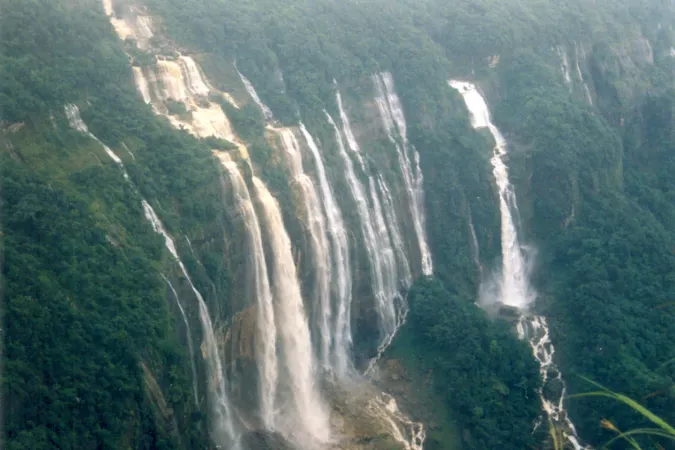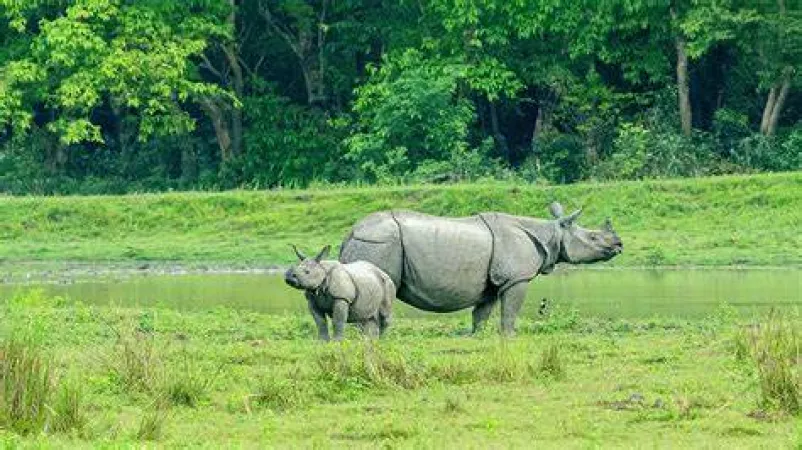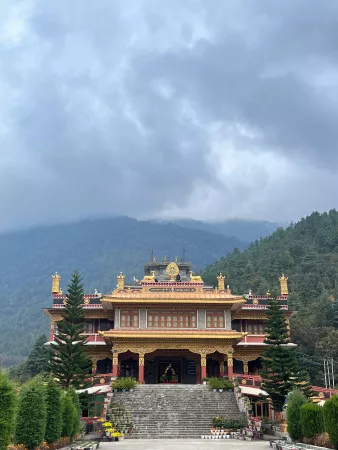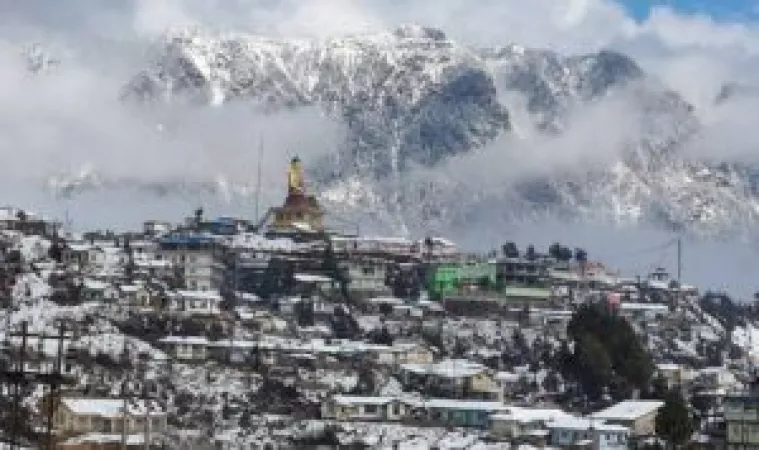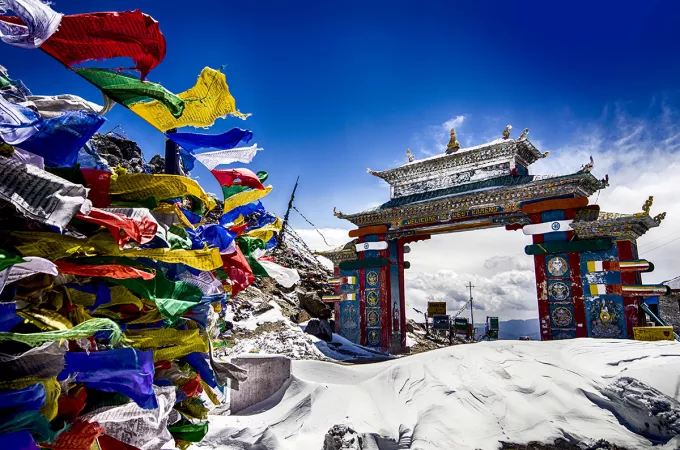5 Top Tawang Tour Packages
About Tawang
Tawang Travel Guide
Tawang, located in the northeastern state of Arunachal Pradesh in India, is a picturesque town renowned for its rich cultural heritage, stunning landscapes, and historical significance. Situated at an elevation of over 10,000 feet, Tawang is famous for its ancient monasteries, scenic beauty, and Tibetan influence.Top Attractions in Tawang
- Tawang Monastery
- Sela Pass
- Nuranang Waterfall
- Bum La Pass
- Gorichen Peak
Tawang is Famous for
Breathtaking landscapes and the iconic Tawang Monastery.Top Attractions in Tawang
- Explore the ancient Tawang Monastery
- Drive through the scenic Sela Pass
- Marvel at the beauty of Nuranang Waterfall
- Visit the Indo-China border at Bum La Pass
- Trek to the base of Gorichen Peak
What's Great about Travelling to Tawang?
- Perfect destination for nature lovers
- Rich cultural experience
- Off-the-beaten-path destination
What's Not So Great about Travelling to Tawang?
- High altitude may cause altitude sickness
- Limited accommodation options
- Remote location with limited connectivity
Travel Tips for Tawang
- Obtain Inner Line Permit for entry
- Prepare for cold weather and high altitude
- Hire local guides for monastery visits
Important Tawang trip information
- Ideal Duration: 4-5 days
- Best Time to Visit: March to October
- Nearby Airports and Railway Stations: Tezpur Airport and Tezpur Railway Station
ReadMore
| Packages | Price | Duration | Destinations | Quotes |
|---|---|---|---|---|
| 8 Nights in Arunachal Pradesh & Assam | ₹ (INR) 42999 | 8 Nights / 9 Days | Bomdila, Cherrapunji, Dirang, Guwahati, Shillong, Tawang | Get Quotes > |
| Exotic North East- 11 Days 10 Nights | ₹ (INR) 40000 | 10 Nights / 11 Days | Dawki, Dirang, Kaziranga National Park, Shillong, Tawang | Get Quotes > |
| Mesmerising Meghalaya Arunachal with Kaziranga 10N 11 D ( Shillong 3 , Kaziranga 2 , Dirang 1 , Tawang 3 , Bomdila 1 ,Guwahati 1 ) | ₹ (INR) 40000 | 10 Nights / 11 Days | Kaziranga National Park, Shillong, Tawang | Get Quotes > |
| Tawang At a Glance | ₹ (INR) 45200 | 5 Nights / 6 Days | Bhalukpong, Bomdila, Dirang, Guwahati, Nameri Nation Park, Shergaon, Tawang | Get Quotes > |
| TAWANG TOUR - THE LAND OF THE MONPAS | ₹ (INR) 49600 | 6 Nights / 7 Days | Bhalukpong, Bomdila, Dirang, Guwahati, Nameri Nation Park, Tawang | Get Quotes > |
Tripclap connects you with top travel agents
Compare Custom Quotes and get the best package deal
- Trusted Network Of 8000+ Agents.
- Book everything together, including stay & transport.
- Compare agent profiles & verified reviews
How It Works?
Compare Custom Quotes from Top Travel Agents.
- Tell us about your trip.
- Get Custom quotes from top agents.
- Choose the package you like
Price Per Person ₹ (INR) 42,999
Price Per Person ₹ (INR) 40,000
Price Per Person ₹ (INR) 40,000
Price For 2 Persons ₹ (INR) 45,200
Price For 2 Persons ₹ (INR) 49,600
FAQ's on Tawang
1. Q1: What is the best time to visit Tawang?
The best time to visit Tawang is from March to October when the weather is pleasant for sightseeing and outdoor activities. Avoid the monsoon season from June to September as landslides are common. The winter months from November to February offer a unique experience with snow-covered landscapes, but some roads may be inaccessible due to heavy snowfall.
2. Q2: Do I need a visa to travel to Tawang?
Tourists visiting Tawang need a Protected Area Permit (PAP) due to its proximity to the international border with China. This permit can be obtained through registered tour operators or online. Indian citizens do not require a permit, but they need to carry valid identification. It is advisable to check the latest visa requirements before planning your trip.
3. Q3: What are the must-visit attractions in Tawang?
Tawang offers breathtaking attractions such as the Tawang Monastery, Sela Pass, Nuranang Waterfall, and Shonga-tser Lake. Don't miss the Jaswant Garh War Memorial, Bum La Pass, and Gorichen Peak for a memorable experience. Explore the local markets for traditional handicrafts and immerse yourself in the serene beauty of the surrounding valleys.
4. Q4: Is Tawang a safe place to travel?
Tawang is generally safe for travelers, but it's essential to respect local customs and traditions. Avoid venturing into restricted areas near the border without proper permits. Stay informed about weather conditions and road closures, especially during the winter months. Exercise caution while trekking or engaging in adventure activities and follow guidelines provided by local authorities.
5. Q5: What is the local currency in Tawang and can I use credit cards?
The local currency in Tawang is the Indian Rupee (INR). While ATMs are available in the main town, it is advisable to carry sufficient cash, especially in remote areas. Credit cards may not be widely accepted, so it's recommended to carry cash for transactions. Inform your bank about your travel plans to avoid any issues with international transactions.
6. Q6: What is the local cuisine like in Tawang?
Tawang offers a unique blend of Tibetan and Monpa cuisine with dishes like Thukpa (noodle soup), Momos, Zan (barley beer), and Khura (fried bread). Try the local delicacy of Yak meat and dairy products for an authentic experience. Vegetarian options are also available, and restaurants cater to various dietary preferences. Embrace the flavors of the region while enjoying the warm hospitality of the locals.
7. Q7: What transportation options are available in Tawang?
Tawang is accessible by road, and shared taxis, private cabs, and buses are the primary modes of transport within the region. Renting a private vehicle or hiring a local guide is recommended for exploring remote areas. Public transport is limited, so it's advisable to plan your itinerary in advance. Be prepared for long hours of travel due to the mountainous terrain, but the scenic views along the way make the journey worthwhile.
8. Q8: Are there any cultural norms or etiquette I should be aware of when visiting Tawang?
When visiting Tawang, it's important to respect local customs and traditions. Dress modestly, especially when visiting religious sites like monasteries. Seek permission before taking photographs of locals or religious ceremonies. Remove your shoes before entering monasteries and follow the guidelines provided by the monks. Greet people with a respectful "Tashi Delek" and participate in local festivals to experience the rich cultural heritage of the region. Avoid discussing sensitive topics like politics or religion and be mindful of your interactions with the local community to ensure a harmonious travel experience.
